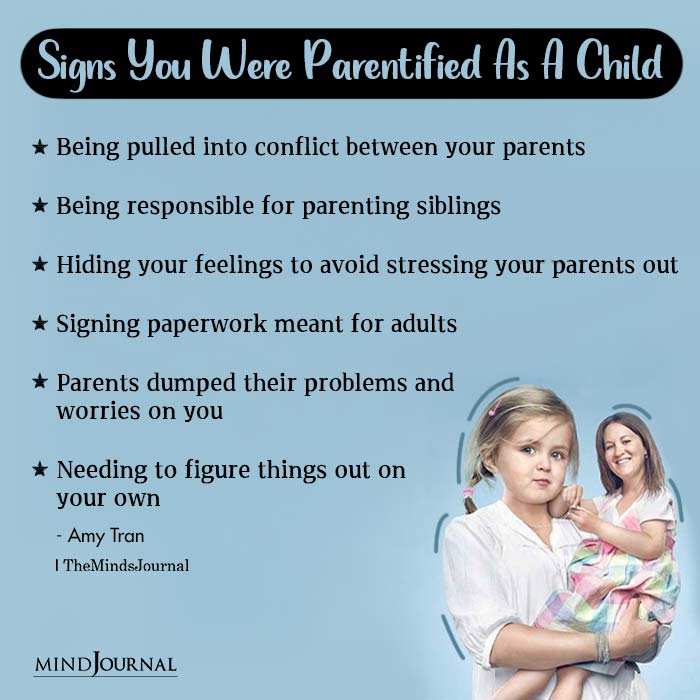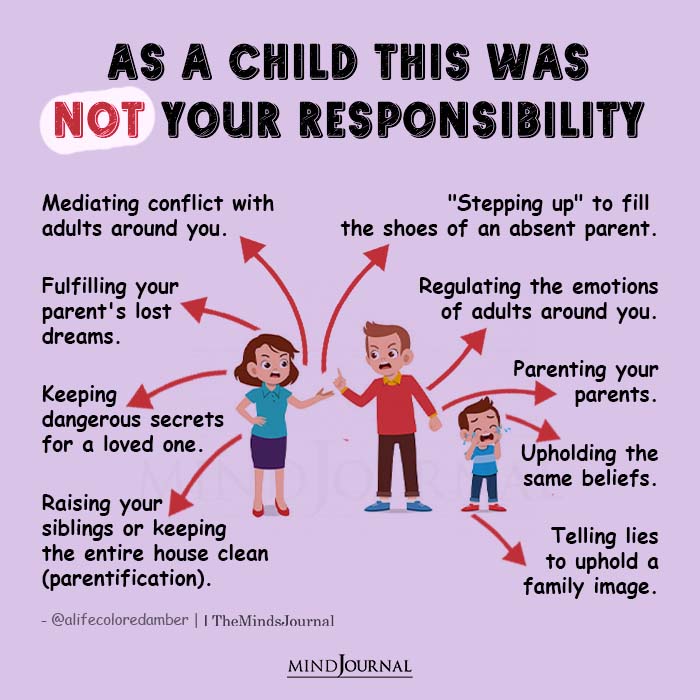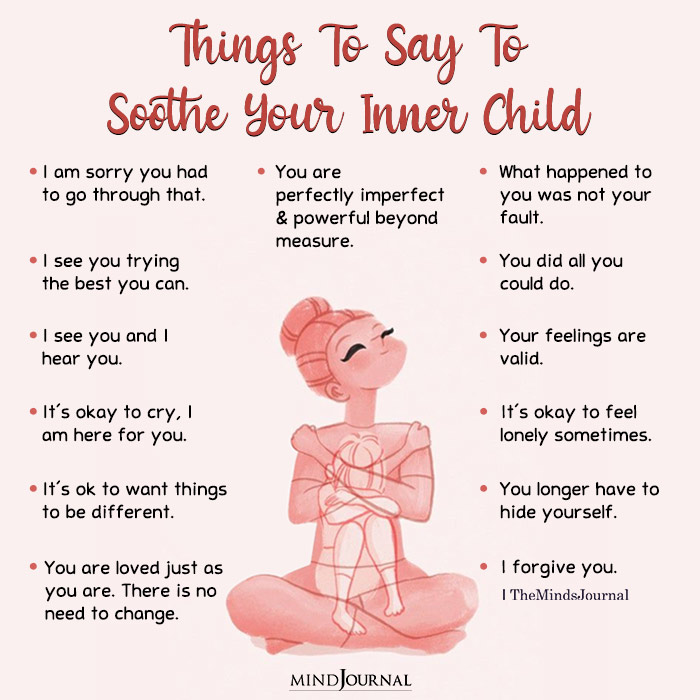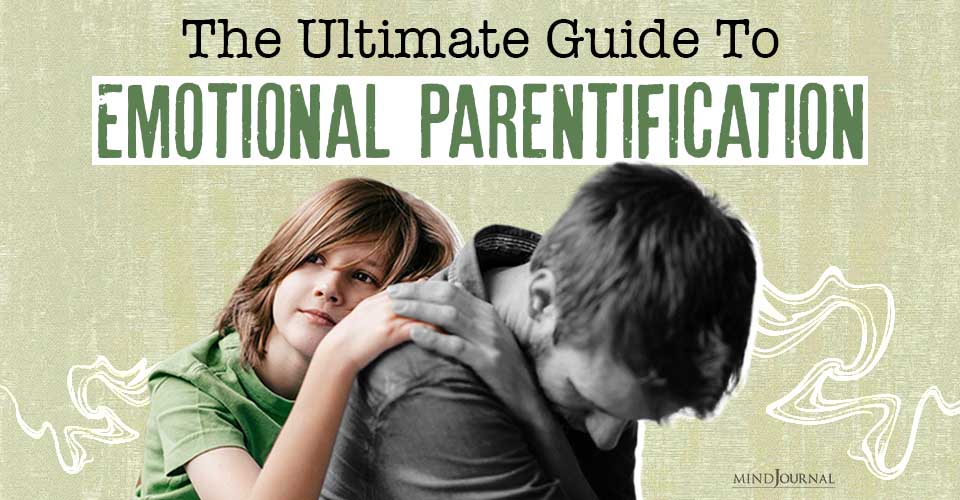Have you ever felt like you were the parent in your relationship with your mom and dad? That’s emotional parentification, and it’s a lot more common than you think.
What is Parentification?
Do you feel like you have been acting the role of a therapist for your parents, regulating their emotions and problem-solving for them? Maybe you may have taken on the part of a caregiver for your siblings?. If you are inclined to answer yes, you may relate to being a parentified child.
Parentification is when there is a role reversal between a parent and child. The child is expected to take on functional responsibilities or the emotional caring of the family members that are not developmentally appropriate for the child. Researcher’s emotional parentification definition is as follows,
2 Types of Parentification
There are two types of parentification- Instrumental Parentification (physical tasks) and Emotional Parentification (taking on the family’s psychological needs).
Emotional Parentification
Emotional Parentification happens when a child is expected to take on the responsibility of their parent’s and/or sibling’s emotional needs and figure out how to respond to them. Many children of immigrants relate to being mediators between family members growing up.
For example, your mom might have shared how poorly she was treated after getting married, and your dad might confess ‘family secrets.’ When a child is placed in a position of advising, they feel pressure to solve a problem they cannot solve on their own.
More importantly, the child’s brain is not developed enough to handle that level of information or responsibility. To clarify, it is okay for parents to wish for love and support from their child. However, when that turns into parentification (role reversal), it can harm their development.
The emotional support, however, probably did not go both ways. There were no adults you could rely on to talk about your feelings and problems worsening your anxiety.
Emotional Parentification signs:
- Diffusing household arguments
- Acting as a confidant for your parents
- Offering advice
- Comforting a parent when they are upset
- You are the primary emotional support for your parents
- Sibling-focused parentification

Instrumental Parentification
Instrumental Parentification happens when a child is expected to take on the functional responsibilities of the household. For example, many children of immigrants may relate to navigating conversations for their parents that were often age-inappropriate.
Signs of Instrumental Parentification:
- Being a primary caregiver for siblings
- Taking on financial responsibility for the family
- Booking medical appointments
- Taking on household duties and being deprived of play
- Taking on the role of a translator
Reason for Parentification
Parentification happens for many different reasons. Children of immigrants often find themselves providing practical, emotional, and cultural guide for their family.
Some common ones include:
- Suffering from a mental illness (parent or sibling).
- Physically disabled and/or has a serious medical condition (parent and/or sibling).
- Parents with unresolved childhood trauma.
- Parents who lack a support system from other adults.
- Parents who struggle with Alcohol or Substance Use Disorder.
- Financial Hardships in the family require parents to work multiple jobs, not being able to afford daycare, and/or the child to take on the caregiver role in the absence of parents.
- Divorce; the boundaries of a child frequently being violated.
- Immigration; parents are challenged with communication barriers, culture shock, and securing employment.
- Death of a parent or sibling.
- Abusive relationships.
Can Parentification be Beneficial?
Some research shows that parentification can be beneficial to a certain extent. It teaches a child responsibility that fosters independence, resilience, and self-competence.
Aude Henin, Co-Director of the Child Cognitive Behavioral Program, suggests asking yourself two questions before trying to parentify a child:
1) Whose needs are being met?
2) Is the demand age-appropriate?
Related: Child Parentification: The Cause, Signs, and Recovery
Is Emotional Parentification Trauma?
Many people ask, is parentification emotional neglect? In extreme cases, emotional parentification is a form of trauma.
When faced with a situation that is not the family norm, parents from a dysfunctional family-lacking emotional maturity- are highly reactive to situations. Something small can be overwhelming for them.
Everything becomes urgent, and they may feel like the world is ending. They turn to their children to help save them or project blame. If you cannot help them, they feel betrayed, which becomes a lack of your love for them.
Your parents may have been neglected by their parents, so their own emotional needs were unmet, making it challenging for them to understand how to support you. This unintentional emotional neglect is due to the emotional patterns passed down to them. The cycle continues.
As a child, you just wanted your parents to be okay. Admitting that something was wrong would threaten your needs. It is easier to blame yourself and deny what you feel rather than admit something is wrong with your family system.
Accepting something is wrong means you have to make a choice. Either reflecting on the system, breaking out or continue pretending it does not hurt.
You may have started recognizing a pattern of frequently trying to accommodate how your parents felt. If they were having a bad day, you may have found yourself brainstorming ideas of what you could do to help them. If they were having a good day, you probably thought about ways to keep that streak going.
Over time, you learn to take the blame for anything that goes wrong or that you cannot fix. You start to turn against yourself.
Emotional Parentification: Effects
When a child is conditioned at a young age to take on the emotional burden of an adult- now as an adult- it can look like this:
- Not engaging in meaningful relationships
- Being afraid to share your emotions
- Not voicing your concerns
- Involving yourself in relationships where you can problem-solve for others
- Confusion when someone does care about your needs
- Depression, anxiety, and isolation
- Anger
- Unable to get past the guilt and shame
1. Victim Mindset
When parents rely on their children to fill their emotional needs, it robs the child of childhood. It teaches the child that being a victim is the only way to get their essential needs met. It also leaves them questioning their own emotions.
While taking care of your parent’s needs, you put your own needs aside. This means you may have your own unmet needs as you enter adulthood. Your parents met your emotional needs when they believed you emotionally supported them the way they wanted.
This is highly toxic as it teaches the child that their needs are too much. This could further lead to the child blaming themselves for everything that goes wrong.

2. Codependency & Unhealthy Relationships
You may have learned to put your needs aside and attend to the needs and feelings of others around you. This can lead to frequently focusing on others instead of honoring what you need and creating a dynamic of codependency.
Many people seek out the ‘high’ they felt growing up, where their needs are rejected, allowing them to create a familiar toxic dynamic.
3. Learning Passive Aggressive Ways of Communicating
Many parentified children learn to put the needs of others before their own needs. Now, as adults, they may be aware of their own needs but do not know how to meet them.
Instead of directly asking for their needs completed, parentified children attempt to communicate their distress without acknowledging their emotions.
Their body language and facial expressions do not correlate to how they feel. In many situations, people may even deny there is a problem. Examples include silent treatment, sarcastic comments, spreading rumors, and/or indirect refusal of requests.
4. Emotion Suppression
Parentified children support their parent’s emotional states, which means they have to put their emotions and feelings aside instead of experiencing them or responding to them.
Growing up, you might have been told that certain emotions were not okay or your feelings were not valid. As a result, you pushed your emotions down and learned not to make space for them.
It was also a way to protect yourself. You might have trouble identifying, expressing, and accepting your emotions as an adult. Suppressing emotions can also lead to mental and physical problems.
Related: Unpacking Parentification Trauma: The Burden of Growing Up Too Soon
5. Loss of Experiences
Parentified children often stay close to their family unit. You may fear your parents/siblings may fall apart if you do not tend to their needs right away. The parent may exploit this further by playing the victim and making you feel guilty if you choose not to be there for them.
You may also continue to pursue this role to seek validation as an adult leading to isolating yourself from life experiences.
6. Struggle with Trusting Others
When you grow up being a parent to everyone around you, you become self-reliant. You grow up believing you need to take care of everything independently. So asking for help can be a foreign concept for you, and it can create a lot of anxiety.
There is a shared guilt, shame, and fear cycle that most parentified children share, wondering if they failed their parents by asking for help.
How to Heal From Emotional Parentification?
1. Therapy
Tell your story. You may be used to suppressing your emotions and memories, feeling guilty for seeking help, talking about your parents in a way that isn’t safe for you, and acknowledging what happened to you.
Acknowledgment is the first step towards healing from your family’s dysfunctional patterns, understanding how those patterns are developed, and how they were passed on through past generations.
The goal is not to blame. Initially, you will blame yourself and justify your parent’s everyday actions. Once you learn to detach from your parents, you will see that your family is unhealthy. You can live another way even if your family chooses not to.
Therapy also allows you to identify and prioritize your own needs before you prioritize the needs of others.
2. Challenge yourself to connect with others
When you grow up being a parent to everyone around you, you become pretty self-reliant. You grow up believing you need to take care of everything independently. Asking for help is pretty foreign to you, and it can create a lot of anxiety.
The first time I decided to seek help- honestly- I was lingering outside the counselor’s office, pretending I was walking around. It took everything in me to step into that office. It almost felt like I failed everyone by asking for help.
There was also this fear that if my parents found out, they would fall apart as if they had done something wrong in raising me. But of course, everyone experiences asking for help differently, but when taking care of everyone else your entire life, know it is OKAY to ask for help.
3. Reparenting Yourself
Parentified children may need to reparent themselves, which means learning to give your adult self what your parents could not give you growing up.
Pay attention to your patterns, reflect on your childhood- what brought you joy, work with your inner critic, go back to things that made you happy, and do things that made you feel safe.
Reparenting includes:
- Learning how to regulate your emotions.
- Engaging in self-care.
- Nurturing self-trust.
- Finding yourself.

4. Journaling
Journaling is one of the most powerful ways to learn about yourself. It allows you to slow down and reflect on your patterns, feelings, and needs.
Growing up, you may have heard things like ‘you are no good, ‘you can’t do anything right, ‘you don’t love me,’ which can damage your self-esteem. Journaling can be a helpful tool for writing down the unhelpful thoughts you are having about yourself and reframing them.
Journaling also allows room to reflect on your own needs. Writing about “what do I need right now” is a way to connect to yourself.
When you feel emotionally activated, you might benefit from movement, breath work, disconnecting from technology, or spending time in nature. Whatever it may be, the idea is to build your toolkit and learn how to show up for yourself.
6. Identify and Name Your Emotions
Thinking about processing your emotions can seem pretty daunting and confusing. Parentified children are not used to focusing on their own emotions, and you might find it overwhelming when you think about where to start.
It starts with taking a moment to pause and checking in with yourself. Ask yourself, “what am I feeling right now, and where I am feeling it in my body.”
The urge of wanting to avoid or suppress how you feel with avoidance coping techniques leads many people to continue living their lives on autopilot.
Checking in with yourself will allow you to notice this urge (scrolling on social media, coping with food, substances, emotional outbursts, etc.), and instead of giving in to the urge, learn to sit with the emotion by focusing on your breath with this 90-second rule:
Jill Bolte Taylor, a Neuroscientist, explains her 90-Second Rule, “When a person reacts to something in their environment, there’s a 90-second chemical process that happens in the body; after that, any remaining emotional response is just the person choosing to stay in that emotional loop.”
7. Set Boundaries
Setting boundaries with your parents can produce a lot of anxiety. As a parentified child, you could not say no to things you did not feel comfortable doing. However, now as an adult, you can set boundaries for anything that does not serve you.
It is important to note that if you have never set limits, it is normal to feel guilty. You can start small and focus on one thing at a time.
Related: Parentification: Healing From The Trauma Of Having To Grow Up Too Soon
Parents, a quick reminder:
Your child is not your therapist.
As a parent, it is your responsibility to provide for your child’s basic needs, which include emotional support. As a parent, you need to find healthier outlets other than your child to seek help for yourself (friend, therapist, community resources.)
A child needs to hear, “You don’t need to worry about me; it is my job to worry about you. I can take care of myself and have enough people I can rely on for support.” Please share with your child that you are going through difficult situations, validate their fears, and allow them to ask questions.
A family can heal. Parents make mistakes. We, their children, make mistakes. It is important to recognize no parent is perfect. They are only humans trying their best like we are.
It is essential to be empathetic about the fact that our parents could not break the cycle but paved the path for us to do it for ourselves and generations to come.
Give them a chance, listen, and don’t immediately choose anger (If anger does surface, process that emotion- there is a reason it is showing up).
Yes, boundaries are essential, but you don’t want such rigid boundaries that you cannot see any potential improvements in your relationship. (This may only be true for some.)
If you are someone who feels responsible for your parent’s feelings, know that you are not alone.
You are worthy of taking up space in this world and deserve to be heard.
Written By Nisha Patel
Originally Appeared On Brown Girl Trauma










Leave a Reply